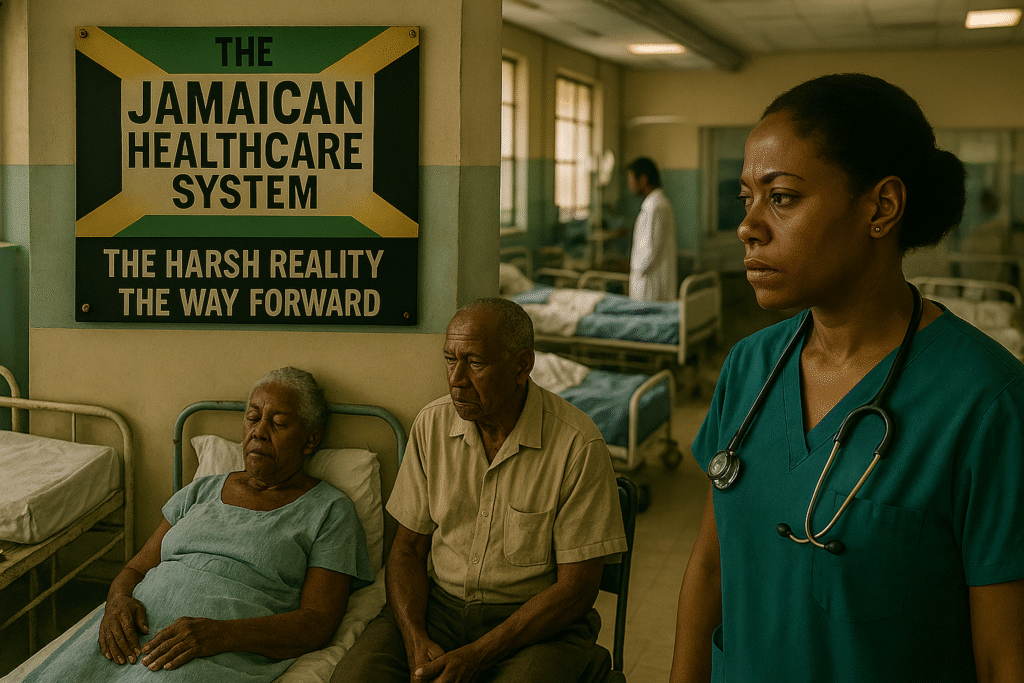
In Jamaica, healthcare is supposed to be a right, not a privilege. Our island operates a dual healthcare system: a public network, funded and managed by the Ministry of Health and Wellness, and a private sector for those who can afford faster, more advanced services. On paper, this model should provide every Jamaican with access to care. In reality, it’s a system under strain—overcrowded, underfunded, and leaving too many without timely treatment.
The Public System: Free, But at a Cost
Jamaica’s public healthcare system is modeled after Britain’s National Health Service, offering free or subsidized care to residents and permanent residents. For many, it’s the only option. But limited budgets, outdated facilities, and chronic staff shortages mean long wait times; sometimes weeks or even months for test results or specialist appointments.
Public hospitals often operate without enough beds, forcing patients to remain on stretchers. While many staff members are highly trained and dedicated, the lack of modern equipment and resources hampers their ability to deliver care effectively. In rural parishes, geographic barriers add another layer of difficulty—some communities are hours away from the nearest hospital or diagnostic center.
The rise of non-communicable diseases (NCDs) like hypertension, diabetes, and heart disease is further straining the system. These conditions require long-term management, but the infrastructure is already buckling under demand.
The Private Sector: Better, But Not for Everyone
Private healthcare in Jamaica offers shorter wait times, cleaner facilities, and advanced technology but at a price. User fees, specialist charges, and out-of-pocket costs put private care beyond the reach of many Jamaicans.
Institutions like the University Hospital of the West Indies (UHWI) and the Sickle Cell Unit provide world-class treatment in certain areas, but they operate on a fee basis. Even private pharmacies and diagnostic labs come with steep costs unless patients have insurance—something many do not.
For vulnerable groups, private facilities may feel safer. Members of the LGBTQ+ community and people living with HIV often choose private care to avoid stigma they fear in public settings. But for the average Jamaican, private healthcare remains a luxury.
When the System Fails: Lives in the Balance
Behind the statistics are real people and devastating stories.
One family’s nightmare began when a mother underwent a biopsy for suspicious masses in her lungs and brain. Results, promised in two weeks, took nearly a month. Her follow-up appointment was set weeks later. When she developed a cough, she was shuffled between hospitals—each unable to provide the urgent care she needed. She spent her final hours on a stretcher at Kingston Public Hospital, never receiving the bed or attention she was promised. Her family never got clear answers about her cause of death.
Another case involved a man in urgent need of surgery at UHWI. His family was told to buy over J$200,000 worth of surgical parts themselves. After purchasing them, days passed with no surgery. They even had to pay for oxygen. He died before the year ended.
These are not isolated incidents—they are symptoms of a system dangerously close to collapse.
A Rural Health Snapshot: Hypertension, Diabetes, and Malnutrition
A 2015 study by Lock Haven University in a rural south-central Jamaican community paints a troubling picture:
- 42% of patients had hypertension—far above national averages.
- 26% were underweight, while 27% were overweight or obese—showing both undernutrition and unhealthy weight gain exist side by side.
- 44% reported a family history of diabetes.
These figures point to a growing crisis in chronic disease management, compounded by poor nutrition and limited access to preventive care. Men, in particular, were underrepresented at clinics—just 19% of patients—likely due to work schedules, cultural attitudes toward seeking care, or lack of targeted outreach.
The Bigger Picture: Why Reform Is Urgent
The Jamaican healthcare system suffers from more than just funding gaps. It’s also plagued by:
- Bureaucratic delays in lab results and specialist referrals.
- Poor communication between doctors, patients, and families.
- Infrastructure shortages, from beds to medical equipment.
- Loss of skilled workers to migration, leaving the system short of experienced staff.
This is not just a public health crisis—it’s an economic one. Families lose breadwinners, businesses lose productivity, and the nation loses the trust of its people.
Personal Responsibility: What We Can Do Today
While government action is critical, Jamaicans also need to take ownership of their health. Too many of the leading causes of death: hypertension, diabetes, heart disease are linked to poor diet, inactivity, and smoking or alcohol abuse.
Here’s where we start:
- Eat Mindfully: Limit sugar, salt, and processed foods. Increase fruits, vegetables, and whole grains.
- Stay Active: At least 30 minutes of exercise, five days a week—walking, dancing, swimming, or sports.
- Get Screened: Annual blood pressure, blood sugar, and cholesterol checks can catch issues early.
- Educate Yourself: Know your family’s medical history and learn how to manage risk factors.
- Support Others: Encourage friends and family to make healthier lifestyle choices.
The fewer preventable illnesses we create through lifestyle, the less strain we place on a fragile system.

The Call to Action
Fixing Jamaica’s healthcare system requires political will, public demand, and personal action. We need:
- Modernized hospitals with enough beds and advanced equipment.
- Improved staff pay, training, and retention to stop the brain drain.
- Faster diagnostic and test result turnaround times.
- Community-based prevention programs targeting NCDs.
- Policies that balance public health needs with humane, flexible visitation rights.
Healthcare reform cannot wait. It’s about saving lives, restoring dignity, and building a system worthy of the Jamaican people.
Bottom line: Jamaica’s health crisis is both a national responsibility and a personal one. The government must overhaul the system—but we must also take charge of how we eat, move, and care for our bodies. The future of healthcare in Jamaica depends on both sides doing their part.
